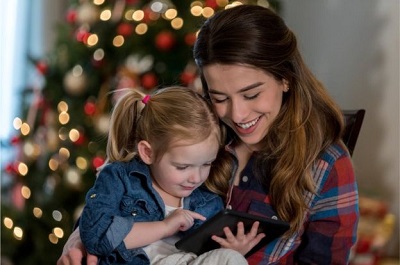Parents and children interact less when reading electronic books together than printed ones, a study suggests.
Researchers from the University of Michigan found parents talked more about the technology than content when using electronic books and the frequency and quality of interactions were better,
The results of studying 37 pairs of parents and toddlers appear in the journal Pediatrics.
In the study, the parents and children were observed reading three different formats – printed books, basic electronic books on a tablet and enhanced e-books with features such as sound effects and animation.
The study found that with e-books parents ended up focusing more on the technology, including, for example, telling children not to push buttons or change the volume.
Doctors said: “Shared reading promotes children’s language development, literacy and bonding with parents and while many of the interactions between parents and young children reading together might appear subtle, they were important in promoting healthy child development.”
Parents might ask questions of the child prompted by the book or relate the story to something the child had experienced.
The reading time could also lead to open-ended questions, such as asking the child what they thought of the book.
“Parents strengthen their children’s ability to acquire knowledge by relating new content to their children’s lived experiences,” said Doctors.
“Research tells us that parent-led conversations are especially important for toddlers because they learn and retain new information better from in-person interactions than from digital media.”
The study found that with electronic books, parents asked fewer questions and commented less about the storyline.
The researchers found that electronic book enhancements were likely to be “interfering with parents’ ability to engage in parent-guided conversation” during reading.
The study authors advise parents who do use e-books for story time to “consider engaging as they would with the print version and minimise focus on elements of the technology itself and non-verbal interactions, including warmth, closeness and enthusiasm, is helping create “positive associations with reading that will likely stick with children as they get older”.
The study authors suggested future studies should look at e-book designs that actively support parent and child interaction.
“Reading together is not only a cherished family ritual in many homes but one of the most important developmental activities parents can engage in with their children,” said authors.
“Our findings suggest that print books elicit a higher quality parent-toddler reading experience compared with e-books.
“Paediatricians may wish to continue encouraging parents to read print books with their kids, especially for toddlers and young children who still need support from their parents to learn from any form of media.”
Lara Kh.

